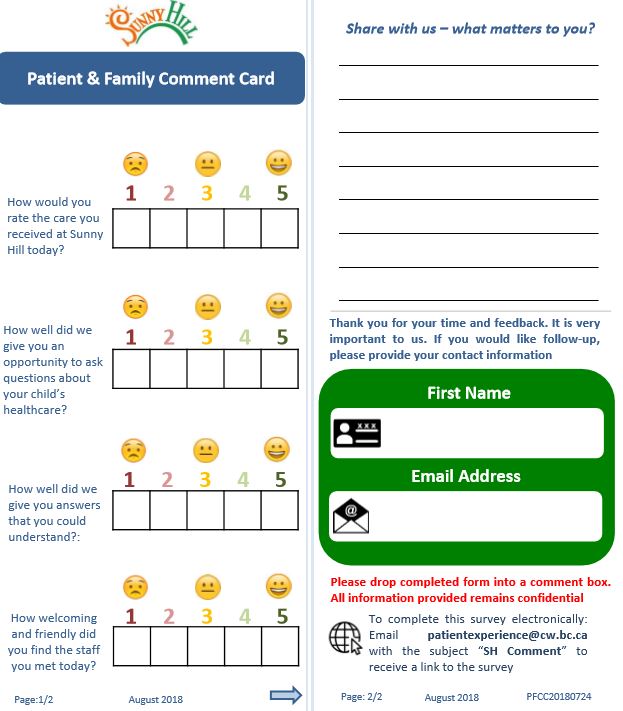Posted • Last updated
Categories: Campaigns, My Experience
Known as the “Small Centre with a Big Heart,” Sunny Hill Health Centre for Children, in Vancouver, provides specialized development and rehabilitation services for children, youth and families throughout BC. The organization saw International “What Matters to You?” Day as a chance to engage staff by encouraging conversations with families. The results were impressive, so we asked Leslie Louie, the centre’s Family Engagement Advisor, to write a blog post about the campaign.
Being heard and participating in your own health care journey are core concepts of person- and family-centred care. To me, that is why “What Matters to You?” has become such a constant reminder of the need to create dialogue, keep meaningful conversations flowing, open up discussions to learn and support what’s important at the moment, and make room for more communication and collaboration.

At Sunny Hill, we strive to develop a culture where meaningful engagement is at the forefront of all the work we do: it supports the improvement of the patient experience, the health outcomes and the health system in general. We created a Patient & Family Comment Card to ask patients and families what matters to them and worked on a series of other activities to engage patients, families and staff in the process of sharing and working on what matters. This led us to learn a lot about our patients and their families. For example:
• A friendly, welcome environment is essential for families to feel safe and reduce anxiety and stress
• Families like being included and participating in the campaign – we received over 40 comments in just one day!
• Families need support navigating from our reception to appointments and waiting areas
• We were able to identify gaps and challenges from the discussions with families and work on solutions to them with our staff and management
We’re now working on everything we learned. To reach our goal – as well as to improve the way we do things and support “What Matters to You?” – we need to start by cultivating a consistent and welcoming impression to the families we serve every day. In our case, it means focusing on the small things, because to our patients and their families, the small things are the big things.
We must always keep in mind that asking “What matters to you?” doesn’t start or end with clients and families alone. It’s also an essential component of staff engagement, for everyone to feel included and heard. It’s so important to weave this into our everyday work to build trust and empathy!
Learn more about the “What Matters to You?” campaign at Sunny Hill Health Centre for Children.
Hear more engagement stories on International “What Matters to You?” Day
Asking “What Matters to You?” has helped improve the patient experience and joy at work for care providers in many health care organizations around the world! If you’re curious to learn more, join us on a webinar on June 6, at 8:00 am, to hear about how Joan Chaya and Damara Gutnick, from New York’s Montefiore Hudson Valley Collaborative, have championed the spread of “What Matters to You?” across a vast provider network in the state. Learn more about the webinar and save the date to your calendar.
Author: Leslie Louie
Leslie is the Family Engagement Advisor at Sunny Hill Health Centre for Children in Vancouver. She is passionate about person- and family-centred care, derived from her own experience of parenting a child with extra needs. Together with staff, she inspires change to support meaningful engagement with families and improve patient experiences.


